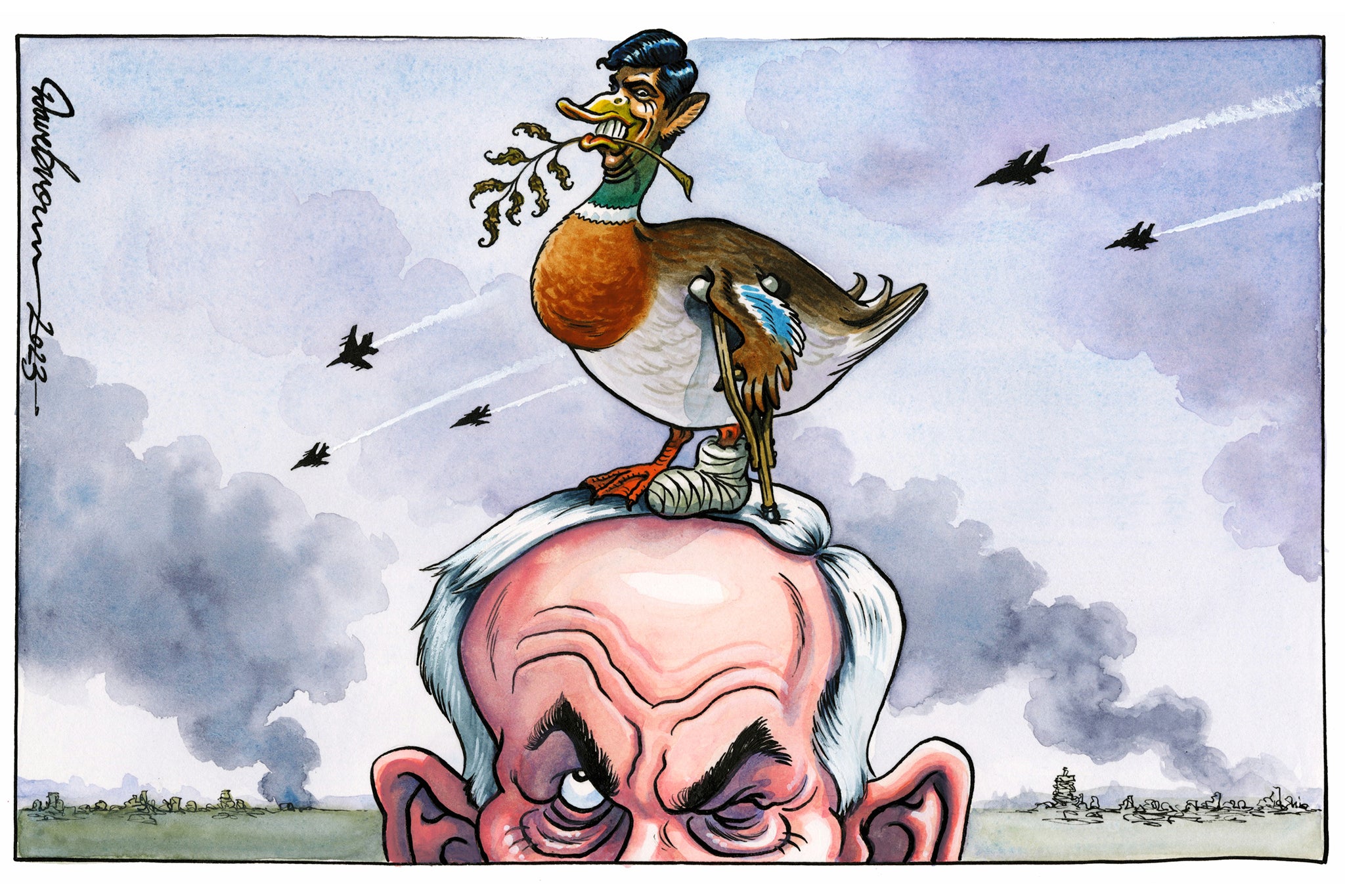Time for peace and reconciliation, Mr Sunak, not a time to seek winners
Editorial: The prime minister’s visit to Israel was an important expression of solidarity between two allies, and a timely reassertion of ‘global Britain’ – but he must also be realistic about the limits of what he can achieve in the region

Britain may be a generally diminished power in world affairs, and even more so post-Brexit, but in the Middle East, there is still the impression that it punches above its weight. Even if it did not, the visits by Rishi Sunak and foreign secretary James Cleverly around the region would be the “right thing to do”, to borrow the political cliche.
It is right for the head of government to join our head of state, King Charles III, in expressing solidarity and offering diplomatic and other assistance. Israel’s trauma is real, and still raw. The pain of families in the UK, from all ethnic backgrounds in the region, is felt keenly, and there is urgent work to be done in securing the release of British hostages and any British citizens trapped in the war zone.
The prime minister and foreign secretary are in the right place at the right time. They rightly enjoy cross-party backing for their efforts, and they are amplifying the united voice of the West. Mr Sunak seemed genuinely moved by the recent atrocities on his arrival in Jerusalem. He is a friend of Israel, but a friend of peace, too, and of the rule of law.
As with President Biden, he cannot offer Israel carte blanche in its war with Hamas. Britain abstained on the most recent UN Security Council resolution that called for a ceasefire. Tabled by the Russians, America vetoed it and France voted for it. That should remind the Israeli prime minister, Benjamin Netanyahu, that allies can’t be taken for granted – and the UK has a seat at that top table.
The UK does, in fact, have influence beyond its economic and military strength, and it still has a role to play in supporting the efforts to maintain the international conventions of war, to mediate and, above all, to help in providing much-needed humanitarian aid. There is no great shame in being, in effect, one of the United States’ junior partners in the effort to save lives, rescue hostages and prevent Hamas, as far as feasible, from ever repeating its gruesome cruelties.
Britain certainly has a special obligation to the region. As the last colonial power in Palestine, the British government, in concert with America and the United Nations, partitioned the territory that gave rise to the establishment of the state of Israel, and the first Arab-Israeli war. That was 75 years ago, but the same forces that drove that original contract are obviously still in evidence today.
That legacy, and a long and sometimes unhappy presence in the region, endows the UK with a special relationship with Israel and the Palestinians, as well as with Egypt and Jordan. Long-standing historical, personal and royal links also bind the Gulf kingdoms and Jordan to the UK. In Iran, sadly, the suspicions dating back to the 1940s still poison relations; but Tehran has few friends in the world.
So what should Mr Sunak be saying? Perhaps offering a more balanced public message. He told President Herzog of Israel that: “I’m proud to stand here with you in Israel’s darkest hour as your friend. We will stand with you in solidarity. We will stand with your people – and we also want you to win.”
“Win” is a curious word to use, however, in a place where conflict is interminable and the notion of destroying Hamas for good, as Mr Netanyahu avers, is simply unrealistic.
The history of Palestinian “resistance” or terrorism is that it is never “defeated” by any military means, no matter how brutal and protracted. Hamas facilities can be degraded, its armaments neutralised, and its fighters captured or killed, and they probably will be in the coming ground campaign. But such a victory would only be temporary. “Winning” cannot be achieved, and certainly not if it is pursued at any cost to civilians. Indeed, that will actually make defeat for Israel all the more likely – an unimaginable outcome.
Israel, in other words, cannot push its military efforts so far as to appall the international community, and to provoke Hezbollah to open up new fronts on the border with Lebanon and the West Bank. There are American forces ready in the eastern Mediterranean, based on two formidable aircraft-carrier groups. The intention is that they should act as a deterrent to Iran and its proxies; and not that they should be “boots on the ground”, actively involved in the fighting.
Mr Sunak has a reputation as a rational leader with a preference for evidence-based decision-making; and, as a candid friend speaking softly, he has to press Mr Netanyahu on his plans for Gaza and the peace process, post-invasion. What is the exit plan? How will Gaza be rebuilt? Who will Israel engage with as legitimate representatives of the Palestinian people? What does “winning” this war look like?
Britain will continue to stand with Israel whoever is in Downing Street. But in return, just as with the Americans, it has a right to ask questions as well as a historic duty to listen.






Join our commenting forum
Join thought-provoking conversations, follow other Independent readers and see their replies
Comments